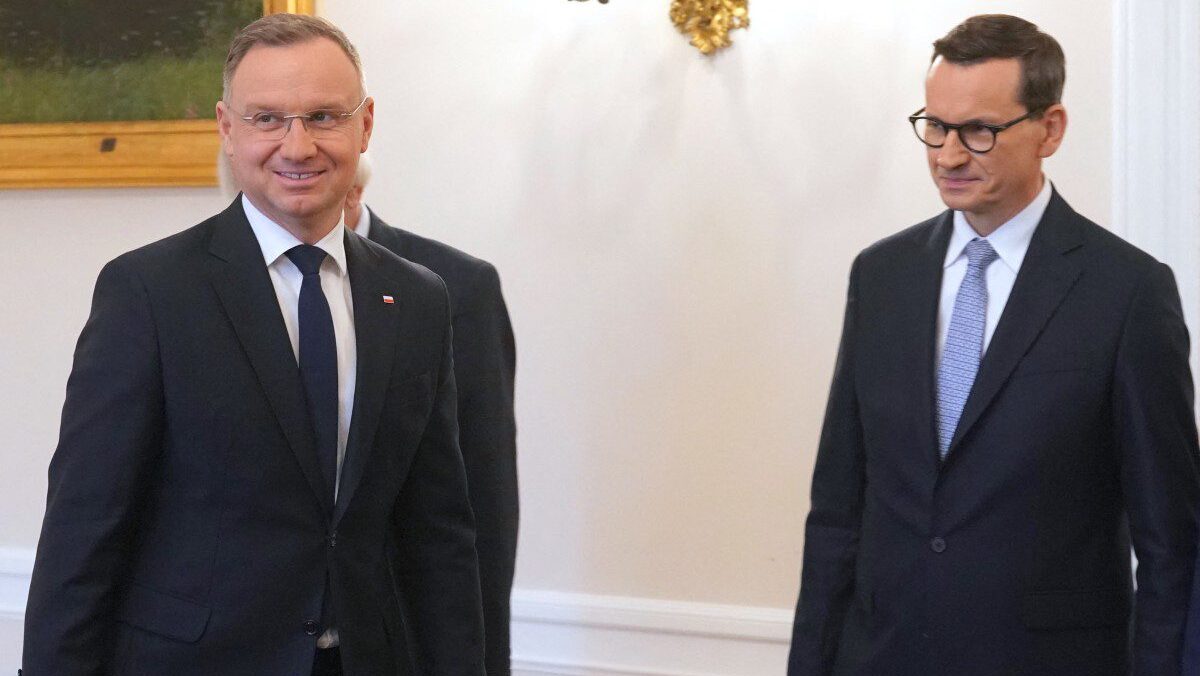
Photo: JANEK SKARZYNSKI / AFP
Polish President Andrzej Duda has tasked Prime Minister Mateusz Morawiecki with forming a new government, three weeks after parliamentary elections were held on October 15th. Although Morawiecki’s party, conservative-sovereigntist Law and Justice (PiS)—in power since 2015—won the largest share of the vote with 35.4% , it failed to gain a majority, and all other political parties and alliances have ruled out entering a coalition with PiS.
PiS gained 194 seats in the 460-member Sejm, and Morawiecki admitted that being trusted with forming a government “represents a big honour, but also a challenge.” He said he invites “all lawmakers who put Poland first to work together.”
15 października Rodacy opowiedzieli się za parlamentem, w którym nie dominuje jedna partia, ale w którym dominować ma współpraca.
— Mateusz Morawiecki (@MorawieckiM) November 6, 2023
Misja, jaką powierzył mi prezydent @AndrzejDuda to wielki zaszczyt, ale i wyzwanie. Dziękuję @prezydentpl za zaufanie. Zapraszam do współpracy…
The prime minister has tried to reach out to the agrarian centre-right Polish People’s Party (28 seats), a member of the Third Way political alliance, and even offered the role of prime minister to its leader, Władysław Kosiniak-Kamysz. However, the latter has ruled out working together with PiS, emphasising that, just like all other opposition forces, his party had run on a campaign of change and that governing with PiS would be a betrayal of their voters.
But even if PiS were to make a deal with the agrarians, right-wing Konfederacja (18 seats) would also be needed for a coalition. They, too, have rejected such an idea, with Przemysław Wipler, a newly elected MP, saying that no lawmakers from his group would give Morawiecki their vote of confidence “under any circumstances.”
Poland, national parliament election results (seats):
— Europe Elects (@EuropeElects) October 17, 2023
PiS-ECR: 194
KO-EPP|RE|G/EFA: 157
TD PL2050/PSL-RE|EPP: 65
NL-S&D: 26
Kon~NI: 18
Majority: 231
➤ https://t.co/TMumh6CCxH#Polska #Wybory2023 pic.twitter.com/F8KLXe73c7
However, Minister of Science and Higher Education Przemysław Czarnek believes that PiS could stay in power. “This is about individual MPs, not political groups. The point is to talk to all lawmakers, and there is a majority of them in the Sejm who are associated with national, independence, and sovereign traditions. And with Christian values,” he told wPolsce.
Morawiecki has two weeks to win a vote of confidence in the Sejm. If he fails, former Prime Minister and President of the European Council Donald Tusk appears likely to be able to build a coalition with a 248-seat majority. Tusk has already signalled that the coalition agreement between the opposition parties “is ready in every aspect,” while “policy differences remain on such issues as abortion.” As we previously reported, Tusk will have an extremely difficult time maintaining the stability of an ideologically diverse government that will consist of three alliances and more than a dozen parties whose only common aim is to oust PiS from power. Divisions have already arisen with disagreements on migration and abortion issues.
While the PiS government has had many clashes with European institutions over its conservative stance involving migration, abortion, gender ideology, and LGBT issues, Tusk would likely align the government’s policies with the EU’s. Tusk has already declared that his first priority will be to unlock €55 billion worth of EU funds, which have been held up due to a dispute between the European Commission and PiS over alleged ‘rule of law’ violations related to appointments in the Polish judiciary.
In a sign of revenge, Tusk has also said he wants to put those accused by his alliance of wrongdoing during PiS’s eight years in power, including President Andrzej Duda, before a state tribunal. “Violations of the constitution and the rule of law will be quickly accounted for and judged,” Tusk’s party, Civic Coalition, stated.
